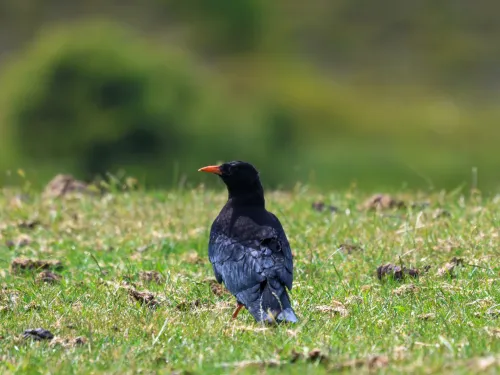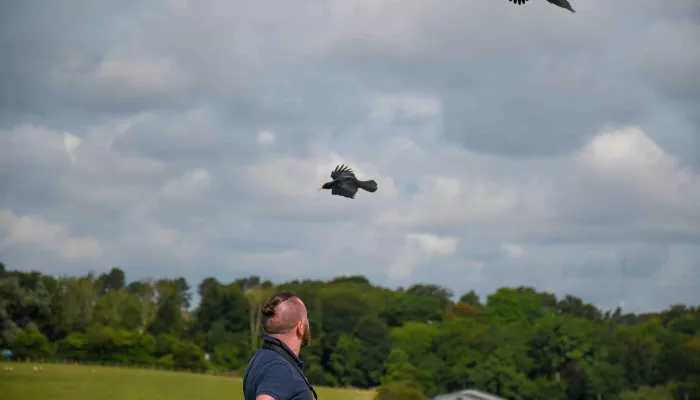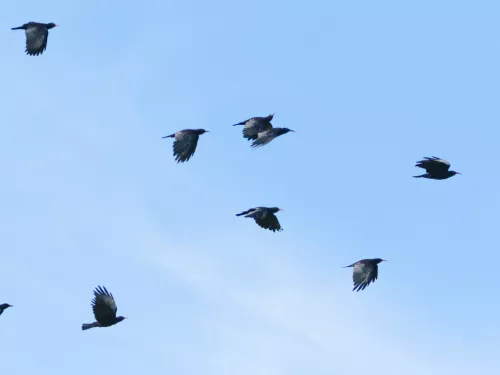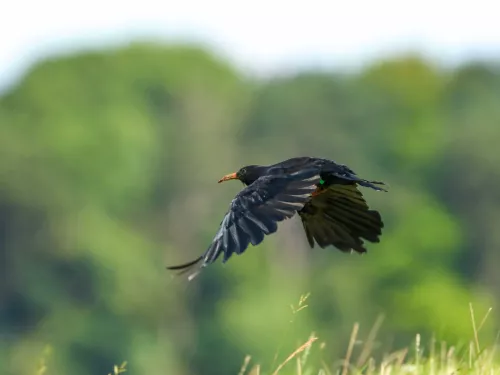
Historic breakthrough as wild-born chough takes to the skies and thrives in Kent for the first time in over 200 years
Conservationists celebrate landmark moment in bid to return red-billed choughs to South East England.

The first clutch of red-billed chough eggs from this year’s breeding season back at Wildwood Trust's aviary.
Laura Gardner, Wildwood's Director of Conservation hopes they’ll be able to replicate the success of the first release when the new chicks are ready to spread their wings this Summer:
“This is another hugely important milestone for the project. We’re expecting the eggs to hatch in the coming weeks and then the hard work really begins.
From the first eggs being laid, to the hatching, rearing and fledging it’s going to be a very busy and exciting few months for the birds and the dedicated teams at Wildwood.
The eight birds from last year’s successful release are flying free and thriving and our hope is to see these fantastic birds nest-building and breeding successfully next year.”
The chough pairs at Wildwood, began nest-building in March this year. Nest building typically involves using large twigs and gradually working in smaller ones, then heather and moss and a lining of horse hair and sheep wool to complete the work.
Once the eggs are hatched the Kent chicks will eventually be joined by chicks from Paradise Park in Cornwall, which has coordinated the captive breeding programme for the species for over 30 years.
The project plan is to release between 30 and 50 chough over five years to help towards the widespread recovery of the birds and their habitat in England.
This reintroduction is only made possible through the dedicated work of conservation organisations over the past four decades. Kent Wildlife Trust has worked alongside the likes of the National Trust and White Cliffs Countryside Partnership, to restore chalk grassland habitat and reintroduce conservation grazing management across East Kent.
Paul Hadaway, Kent Wildlife Trust's Director of Conservation said: “The chough reintroduction has been made possible through decades of chalk grassland restoration by Kent Wildlife Trust, the National Trust and the White Cliffs Countryside Partnership and supported by Kent Downs AONB with our Dover Downlands Project. With their combined efforts, and the expertise of Wildwood Trust, the release of the first cohort of birds has been a success.
“We now turn our attention to building on these efforts and the first clutch of eggs is a key moment for the project team and our supporters. The continued efforts of the conservation charities involved in the reintroduction will hopefully result in this flagship species becoming a common sight in Kent once more.”
Nationally this Kent population will be the first in a series of planned chough reintroductions along the south coast of England acting as stepping stones to join up remaining isolated and fragmented populations.
These reintroductions will increase the numbers of chough in the British Isles as well as establishing new populations that will facilitate the movement of birds between colonies, making them more sustainable and resilient.
For more on the chough reintroduction project, click here.
If you are interested in the birds already flying freely in Dover, their personalities and what they are up to now, click here.
Press assets, video and project history can be viewed here.
Choughs have been absent from the wild in Kent for over 200 years due to habitat loss and historical persecution. Yet, this species has retained a deep cultural link throughout Kent's history - these iconic birds can be spotted on pub signs across our county as well as on the Canterbury coat of arms itself.
Extensive feasibility studies have shown that, thanks to this dedicated restoration work, there is now suitable habitat to support the return of wild red-billed choughs to Kent - and we couldn't be more delighted to welcome them back.
In July 2022, the first cohort of birds were set free in Dover and now can be spotted soaring over the white cliffs and often frequent Dover Castle. You can find out more about the first release here.
You can find out more about the individual personalities of the birds and what they have been upto here.
About Wildwood Trust: Wildwood is an international centre of excellence for the conservation of British Wildlife. Since 1999, we’ve been devoted to protecting, conserving and rewilding the UK. Our purpose is to give native species a future.
Thanks to the generous support of our members and visitors, we are proud to have led a multitude of nationally significant conservation projects - but that’s just the beginning. We made a promise to do all that we can to save our native wildlife, and we intend to keep it. We can only do this with your help.
About Kent Wildlife Trust: Kent Wildlife Trust is the county’s leading conservation charity with more than 31,000 members and over 1000 registered volunteers. We manage and protect over 9000 acres of land across more than 80 different sites and nature reserves, alongside 3 visitor centres.
We work closely with local communities, landowners and partners to protect and improve habitats in the countryside, coast and town for the benefit of the wildlife and people of Kent.The charity also campaigns against inappropriate and damaging development; and educates and inspires young people to help secure a more sustainable future and create a Wilder Kent.

Conservationists celebrate landmark moment in bid to return red-billed choughs to South East England.

Nature-themed crafts on offer for young visitors to the festival

A total of nineteen red-billed chough have now released into the wild as part of a groundbreaking conservation project to return the at-risk species to Kent.